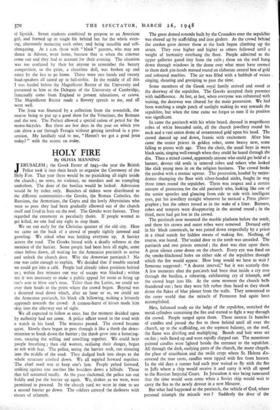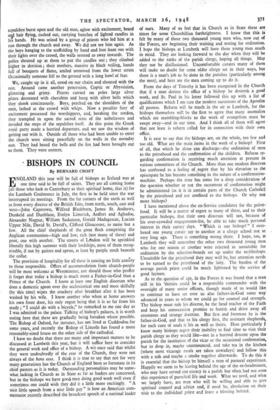HOLY FIRE
By OLIVIA MANNING
JERUSALEM ; the Greek Easter of 1943—the year the British Police took it into their heads to organise the Ceremony of the Holy Fire. That year there would be no picnicking all night inside the church ; no rows, no violence, no murders and no trampling underfoot. The door of the basilica would be locked. Admission would be by ticket only. Bunches of tickets were distributed to the different communities—the Greeks, the Roman Catholics, the Russians, the Armenians, the Copts and the lowly Abyssinians who were so poor they had been gradually elbowed out of the church itself and lived in huts on the roof. The Greeks were furious. They regarded the ceremony as peculiarly theirs. If people wanted to get killed, no one had any right to stop them.
We set out early for the Christian quarter of the old city. Here we came on the back of a crowd of people tightly jammed and growling. We asked what was holding everyone up. A barrier across the road. The Greeks hissed with a deadly softness at the mention of the barrier. Some people had been here all night, some since before dawn, all waiting for the Armenian patriarch to arrive and unlock the church door. Why the Armenian patriarch ? No one was calm enough to explain. We decided that if trouble started we could get into a café. People had already taken positions behind us ; within five minutes our way of escape was blocked ; within ten it was necessary to make a public appeal for room to bring up one's arm to blow one's nose. Taller than the Latins, we could see over their heads to the point where the crowd began. Beyond was a deserted road down which, after an hour or so, we could see the Armenian patriarch, his black silk billowing, making a leisurely approach towards the crowd. A cannon-burst of hisses made him skip into the alleyway out of sight.
We all expected to follow at once, but the moment decided upon by authority had not come. A police officer stood in the road with a watch in his hand. The minutes passed. The crowd became quiet. Slowly there began to pass through it like a throb the deter- mination to break down the barrier ; the throb grew into a battering- ram, swaying the willing and unwilling together. We could hear people breathing ; then old women, realising their danger, began to sob with fear. The police, seeing the barrier rock, ran shouting into the middle of the road. They dodged back into shops as the whole structure crashed down. We all toppled forward together. The chief need was to keep one's feet. People pelted forward, striking against one another like boulders down a hillside. Those that fell screamed madly. As the pace slackened, the police ran out boldly and put the barrier up again. We, shaken, as we were, were permitted to proceed. In the church yarci we were in time to see a second barrier go down. The soldiers entered the darkness with shouts of triumph.
The great domed rotunda built by the Crusaders over the sepulchre was shored up by scaffolding and iron girders. As the crowd behind the cordon grew denser those at the back began climbing up the struts. They rose higher and higher as others followed until a weight of humanity overhung the floor. People admitted to the upper galleries gazed tiny from the rails ; those on the roof hung down through windows in the dome over what must have seemed to them dark pin-heads massed round an elaborate central box of gold and coloured marbles. The air was filled with a hubbub of voices. singing, shouting and gossiping to pass the time.
Some members of the Greek royal family arrived and stood at the doorway of the sepulchre. The Greeks accepted theit presence with indifference. At last, at last, when everyone was exhausted with waiting, the doorway was cleared for the main procession. We had been watching a single patch of sunlight making its way towards the sepulchre, but when the time came we forgot to note if its position was significant.
In came the patriarch with his white beard, dressed in magnificent robes of white brocaded satin, all the church jewellery round his neck and a vast onion dome of ornamented gold upon his head. The crowd danced up and down, frantic with excitement. After him came the senior priests in golden robes, some, brassy new, some falling to pieces with age. Then the choir, the usual boys in worn black satin, singing well enough when they could be heard through the din. Then a mixed crowd, apparently anyone who could get hold of a banner, devout old souls in tattered robes and others who looked like slick young men in on the religion business. The crowd broke the cordon with a maniac uproar. The procession, headed by major- domos thumping the floor with silver-headed sticks, fought its way three times round the sepulchre. There was respect and a certain amount of protection for the old patriarch who, looking like one of the senior apostles and glancing from side to side with intelligent eyes, put his jewellery straight whenever he noticed a Press photo- grapher; but the others tossed as in the wake of a liner. Banners, robes and tempers were disappearing in the second round ; in the third, most had got lost in the crowd.
The patriarch now mounted the marble platform before the tomb, and there his crown and outer robes were removed. Dressed only in his black canonicals, he was patted down respectfully by a priest in a ritual search for hidden means of making fire. Nothing, of course, was found. Thesealed door to the tomb was unsealed. The patriarch and two priests entered ; the door was shut upon them. A great silence came down on the church. Every eye was fixed on the smoke-blackened holes on either side of the sepulchre through which the fire would appear. How long would we have to wait ? Someone suggested : "A decent interval," but it was scarcely that. A few moments after the patr:arch had been shut inside a cry rose through the basilica, a vibrating, exhilarating cry of triumph, and the crowd leapt into life. At the same moment the church bells thundered out ; here they were felt rather than heard as they shook down the flakes of blue plaster from the walls. They announced to the outer world that the miracle of Pentecost had again been accomplished.
Men, balanced ready on the ledge of the sepulchre, snatched the metals cylinders containing the fire and started to fight a way through the crowd. People surged upon them. Those nearest lit bunches of candles and passed the fire to those behind until all over the church, up to the scaffolding, on the topmost balcony, on the roof, the flame was dividing and multiplying. Beards and hair were set on fire ; veils flared up and were rapidly slapped out. The monstrous painted candles were lighted beside the entrance to the sepulchre. All through the dark, outlying parts of the church, the many chapels, the place of crucifixion and the twilit crypt where St. Helena dis- covered the true cross, candles were tipped with fire from heaven. In the old days a runner had each year waited to fly with the fire to Jaffa where a ship would receive it and carry it with all speed to the Russian Imperial Court. In Jerusalem it was being rumoured that the time would soon come when a Soviet ship would wait to carry the fire to the newly devout in a new Moscow. But what had happened to the patriarch, the vehicle of God, whose personal triumph the miracle was ? Suddenly the door of the sepulchre burst open and the old man, aglow with excitement, beard 91 hair flying, rushed out, carrying bunches of hghted candles in his hands. He was seized by a group of priests who led him at a run through the church and away. We did not see him again. As the boys hanging to the scaffolding by hand and foot leant out with their lights over the crowd, the wall,s seemed to sway inwards. The police shouted up at them to put the candles out ; they climbed higher in derision ; their mothers, massive in black veiling, hands full of bouquets of flame, smiled unmoved from the lower struts Occasionally someone fell to the ground with a long howl of fear.
We, caught up in it all, stood on our chairs and shouted with thy rest. Around came another procession, Coptic or Abyssinian, glittering and grimy. Priests carried on poles large silver plates decorated with cherubim and hung with silver bells which they shook continuously. Boys, perched on the shoulders of the men, lashed at the crowd with whips. Now a peculiar fury of excitement possessed the worshippers, and, breaking the cordon, they trampled in upon the sacred seats of the unbelievers and invaded the steps of the sepulchre itself. At this point the Greek royal party made a hurried departure, and we saw the wisdom of. getting out with it. Outside all those who had been unable to enter the church were sitting peacefully on the walls in the noonday sun. They had heard the bells and the fire had been brought out to them. They were content.



































 Previous page
Previous page